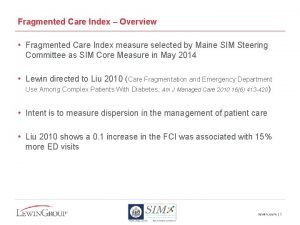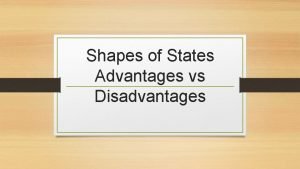Discussion of Causes and Consequences of Fragmented Care






- Slides: 6

Discussion of: Causes and Consequences of Fragmented Care Delivery: Theory, Evidence and Public Policy Author: Leila Agha, Brigham Frandsen, Jim Rebitzer Discussant: Keith Marzilli Ericson

Care Coordination & Spending • Care coordination is widely hypothesized to improve quality and reduce costs • Lack of coordination motivates many public policy initiatives: • ACOs • PCMH & Health Homes for Medicaid beneficiaries • New Medicaid procedure codes (created 2008) allowing for reimbursement for medical team conferences, other codes (2013) for chronic care coordination services

Key Contributions • Identified evidence on the link between care fragmentation and utilization • Moving to area with 1 SD higher fragmentation -> 0. 63 SD increase in individual utilization & 10% higher utilization • Symmetric for moves to high/low fragmentation • Link between regional variation in care fragmentation and regional variation in spending • Fragmentation can account for only 30% of regional variation in costs • Channels: • Primary care fragmentation v. across specialty fragmentation • Both matter. Note: primary care fragmentation actually reduces PCP visits, increases hospitalization

Interpretation • Fragmentation is not one thing • Primary care fragmentation trades off better PCP relationship for convenience (get a quick appointment) • Across-specialty fragmentation trades off relationship with expertise • Other team-based measure of fragmentation (PCP relationships with specialists, Agha et al 2018) • Large open question: quality? • Could be tradeoff (specialization) • Or fragmentation could be higher cost lower quality • Primary care frag->more hospitalizations • Though caution: Higher point est, but can’t reject other measure has same effect

Who are the compliers? • Move from low to high fragmentation region • Never-taker: does not experience change in fragmentation • Compliers: fragmentation goes up • Estimated effect is about fragmentation for which there is disagreement between regions • Example: diabetics always get similarly fragmented care, but recent heart attack patients get diff levels of frag • Could do analyses here • Policy levers might not target different the types of fragmentation seen here

What are the policies? • “Make Florida more like Minnesota” is not a real policy (though moving patients to Minnesota could be!) • Coordination undersupplied in FFS, ACOs internalize some costs • Incentive to reduce fragmentation since it leads to more costly care. Effect on welfare ambiguous because can also reduce quality • Making coordination easier (EMRs), paying for coordination • Observed “fragmentation” unchanged or even increase. Quality likely increase. Spending ambiguous • Welfare effect ambiguous, if costs are not internalized • Physician optimizing assumption may be wrong










